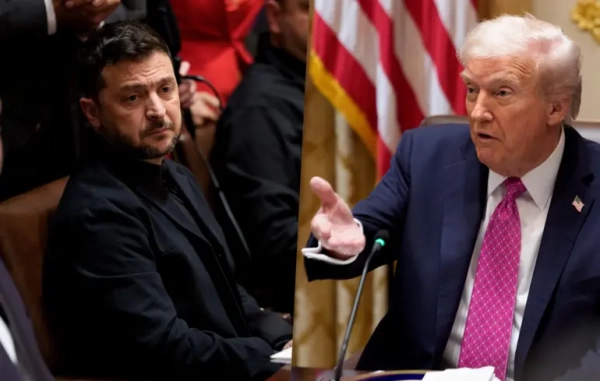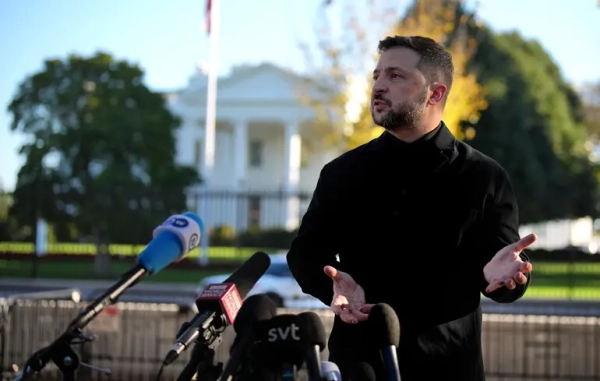
Last Monday, a federal district court held that the mere fact that Trump is president does not make him immune him from a New York City prosecutor’s effort to subpoena Trump’s tax returns from Mazars USA, the president’s accounting firm. Then, on Friday, the powerful United States Court of Appeals for the District of Columbia Circuit held that Mazars must turn over many of Trump’s financial records to the House Committee on Oversight and Reform.
Mazars indicated that it will comply with these subpoenas if the courts ultimately order them to do so. That sets the Mazars cases aside from other fights to uncover information about the president: Trump’s pledge of maximal resistance to the impeachment probe suggests that he will not turn over any documents in his own possession, but he can’t prevent a third party like Mazars from complying with a subpoena.
We still don’t know what’s in the financial records investigators hope to uncover, and we might not know what’s in these documents for a very long time. In the New York case, Trump v. Vance, the Second Circuit stayed the district court’s decision “pending expedited review by a panel of the Court,” which could be scheduled as early as next week.
The DC Circuit case, Trump v. Mazars, is also in limbo. Though the appeals court ruled against Trump on Friday, the court announced shortly thereafter that the order would not take effect right away — and could likely be delayed even further if Trump files a petition asking all eleven of the DC Circuit’s judges to rehear the case.
In practice, such a petition could delay resolution of this case for months. Though the DC Circuit is unlikely to agree to rehear this case, the court’s judges could spend weeks or even months arguing among themselves — and producing opinions memorializing those arguments — about whether to grant a petition for rehearing.
Looming over all of this is the Supreme Court, with its Republican majority that frequently backs Trump after the president runs into trouble in lower courts. Even if the Supreme Court ultimate rejects Trump’s arguments on the merits, it too could delay resolution of these cases by months or even more than a year — potentially letting Trump keep his finances secret until the 2020 election is over.
Trump’s legal arguments are embarrassingly weak
Current law does not support Trump’s claims that he can block the Mazars subpoenas.
In Vance, the New York case, Trump made what Judge Victor Marrero described as an “extraordinary claim” that “the person who serves as President, while in office, enjoys absolute immunity from criminal process of any kind.” There are many problems with this argument, but the biggest is probably the Supreme Court’s decision in Clinton v. Jones (1997).
Jones held that “it is settled law that the separation-of-powers doctrine does not bar every exercise of jurisdiction over the President of the United States,” and it explained that the Court has “never suggested that the President, or any other official, has an immunity that extends beyond the scope of any action taken in an official capacity.” Because the Mazars subpoenas seek financial records unrelated to Trump’s conduct in office, Jones suggests that Trump cannot block those subpoenas.
Trump’s arguments in Mazars, the congressional subpoenas case, are equally weak. As the Supreme Court explained in Eastland v. United States Servicemen’s Fund (1975), Congress’ investigatory power extends broadly to subpoenas “intended to gather information about a subject on which legislation may be had.” The House Oversight Committee says that it wants Trump’s financial records, in part because it is considering whether laws imposing financial
The DC Circuit’s decision in Mazars did produce a dissent, from Trump appointed Judge Neomi Rao. Rao is a former Trump White House official and law professor whose academic work often resembled trolling. In a 2011 article, for example, Rao criticized a French court decision upholding a ban on a practice known as “dwarf tossing,” where little people are paid to be thrown. According to Rao, this law “coerce[s] individuals by forcing upon them a particular understanding of dignity.”
In Mazars, Rao argued that the House investigation into Trump’s finances is illegal because the House did not specifically declare it to be part of an impeachment inquiry, and impeachment is the only “way for Congress to investigate illegal conduct by the President.”
“No case law supports the dissent,” Judge David Tatel explained for the Mazars majority. Rather, as the Supreme Court held in Sinclair v. United States (1929), Congress’ power “to require pertinent
Even if Trump loses in the Supreme Court, he may win by running out the clock
So Trump’s arguments are weak and, at least so far, the only judge willing to back him in these lawsuits is a Trumpy outlier whose views are well to the right of the median justice. It’s always dangerous to make predictions about how the Supreme Court will rule in a particular case. But if the justices follow existing law, there’s no basis whatsoever for a decision holding that Trump is immune from oversight.
Trump, however, doesn’t actually need to win these cases to prevent his finances from becoming public before the 2020 election — the last realistic chance to hold him accountable for anything in the Mazars documents. He just needs to prevent the subpoenas from being enforced before early November of 2020. And there’s a good chance he could succeed in this plan.
Because the Mazars case was already decided by a federal appeals court, while the Vance case is still awaiting a hearing in the Second Circuit, it’s likely that Mazars will be the first case to reach the Supreme Court. On Twitter, University of Chicago law professor Daniel Hemel lays out how this case is likely to proceed from here.
To translate this a bit, Trump’s lawyers have at least 14 days — starting from last Friday — to file a petition asking the full DC Circuit to rehear this case. Currently, the DC Circuit has seven Democratic appointees and only four Republicans, so this petition is unlikely to be granted. But Rao and her fellow Trump allies on the court could potentially delay resolution of that petition by writing a dissent from the court’s decision to deny the petition. It’s also possible that one or more of the DC Circuit’s Democrats will chose to write their own opinion responding to Rao in order to prevent her from having the last word before this case goes to the Supreme Court.
Altogether, this internal fight over the petition for a rehearing could take weeks or even months to resolve.
Once the DC Circuit announces that it will not rehear Mazars, the Supreme Court will get its first and most important crack at the case. Last May, the House agreed “to suspend the time for production set by the subpoena during the pendency of this appeal.” Thus, the House indicated that it will not enforce the subpoena so long as the DC Circuit is still considering the case.
Once the DC Circuit’s consideration ends, however, the House is unlikely to agree to a further delay — as doing so could delay resolution of this case until after the 2020 election. So Trump will likely petition the Supreme Court for a stay of the DC Circuit’s opinion permitting the House to enforce its subpoena.
If the Supreme Court grants this stay, that’s the ballgame. After the DC Circuit denies rehearing, Trump will have between 90 to 150 days (depending on whether the Supreme Court grants him a 60 day extension) to formally ask the Supreme Court to hear Mazars on the merits. If the justices ultimately decide to take the case — and the four most conservative justices can extend a stay by agreeing to hear the case — that means that the Supreme Court is very unlikely to decide this case until its 2020-’21 term. And the Court typically decides the most contentious cases in the final days of its term.
That means a decision is unlikely before June 2021 if the Supreme Court agrees to stay the DC Circuit’s decision. By that point, Trump will either be a former president or he will be firmly ensconced in his second term.
It should go without saying that a congressional oversight process that allows for this sort of delay is profoundly broken. Democrats took over the House last January, in part on a promise to subject Trump to the kind of oversight that Republicans avoided when they controlled the House. A federal district judge first held that Mazars must comply with the subpoena last May. It’s now October, and even if the Supreme Court denies a stay of the DC Circuit’s decision, we are probably months away from the day when the subpoena is enforced.
In Eastland, the Supreme Court indicated that court proceedings seeking to block congressional oversight of the president should “be given the most expeditious treatment by district courts because one branch of Government is being asked to halt the functions of a coordinate branch.” But these cases have not been given such treatment once the district court issued its order. As a result, Trump may win his bid to prevent the Mazars subpoenas from doing any damage to him, even if he ultimately loses in court.
Sourse: vox.com






